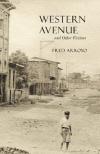Western Avenue
Don’t let the title of Fred Arroyo’s latest collection of short stories, Western Avenue and Other Fictions, fool you. “Fiction” is hardly the right word for what Arroyo has done here. If these insightful, living, breathing stories are fiction, I’d be hard pressed to imagine what reality must look like.
Don’t let the title of Fred Arroyo’s latest collection of short stories, Western Avenue and Other Fictions, fool you. “Fiction” is hardly the right word for what Arroyo has done here. If these insightful, living, breathing stories are fiction, I’d be hard pressed to imagine what reality must look like.
As a Midwest native and Chicago transplant, I can attest firsthand to just how lifelike Arroyo’s descriptions of North Clark Street and the factories along Lake Michigan in Northwest Indiana are. The snapshots of poetry peppered throughout the collection paint a portrait of urban immigrant life even more vividly than a photograph could.
But, of course, it’s not the place that is at the heart of these stories—it’s the people. While the stories contained in Western Avenue feature an ensemble cast of characters, they are all masterfully connected, and each story gives the reader a new perspective into the journey of a family.
Starting with the collection’s first story, “A Case of Consolation,” where aspiring chef Boogaloo makes what could be a love connection with a woman who disappears in an immigration raid, we are introduced to a family of individuals who are real and imperfect, desperately striving to balance the demands of their laborious lives with their relationships with each other.
Many of the stories in the collection center on Ernestito (or Ernesto as a young man, then Ernest as an adult). From “Acceptance,” where Ernestito struggles to balance an overworked mother and an alcoholic father, to “Western Avenue,” where a grown Ernest makes a connection with a Polish immigrant whom he works with and suffers alongside of in the factory, we watch him grow in awareness and strength, and it’s often through his eyes that we see the experience of his family, like in this passage:
My father. Here he is in this photograph, turned to the bone-white light of the moon falling through the window, now arranged alongside others, and then for a moment I make out the outline of my father’s working childhood: the sharp sweat in his eyes, the cutting burn of a rope along his wrist, his heart harvested by those ripening seasons of pineapple, mangoes, cane . . .
As a collection, Western Avenue is a filmic glimpse into the immigrant experience in the Midwest and in America through the eyes of those who have lived it and who continue to live it every day. From its language to its characters to its stories, this collection is an important look at the times in which we live.





